Urban Poulations and Water
We will fail on climate change if we fail on water. We will also fail on each and every one of the Sustainable Development Goals.
Education for building resilience for climate change
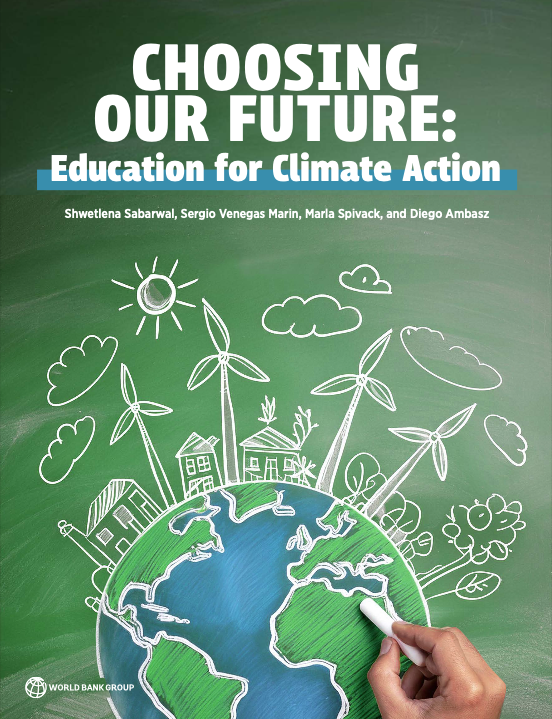
7 ways to restore land and halt desertification
Download : https://sarainwater.org/wp-content/uploads/2024/08/1723790150894.pdf
Is green water invisible on policy makers calculations?
The invisible water in the calculations of policy makers
Currently, the way we measure water stress is by looking at how much freshwater is available to meet our demands. However, this “blue” water – the water in lakes, streams, and rivers – does not account for the freshwater that is held as moisture in soils and as vapor in the air. Air condenses in rains that feed our rivers and our soil where water slowly returns to the atmosphere through evaporation and transpiration from vegetation. This “green” water constitutes about 60% or all rain on land, yet it is essentially invisible in the calculations of policymakers, financiers and business leaders. Ignoring this critical component not only puts water security at risk, with this we undermine all sectors in society and the foundation for an equitable and sustainable future for all.
Climate of the publication of the middle understanding
Climate resilient WASH programming UNICEF guidelines
Download : https://sarainwater.org/wp-content/uploads/2024/07/UNICEF-guidance-note-climate-shift.pdf
Guidelines for dafe disposal of waste in humanitarian contexts
Water and waste water in dense unplanned urban settlements
Download – https://sarainwater.org/wp-content/uploads/2024/07/Publication-water-and-waste-water.pdf
Water and Sanitation how to make public investments work.
Download – https://sarainwater.org/wp-content/uploads/2023/11/Financial-Handbook_EN.pdf
Fundamentals on climate change
Download PDF: https://sarainwater.org/wp-content/uploads/2023/10/the_climate_dictionary_0.pdf
Urban flood risk handbook
Floods in urban areas are an important reminder of the vulnerability of our cities and the complex challenges they face in managing their growth and development. As urbanization continues to accelerate around the world, the impact of floods on densely populated areas is becoming more pronounced. Increasing pressure on the availability of urban land and space pushes urban development into low-lying river and coastal areas, often ignoring planning restrictions, disrupting natural processes, and placing more vulnerable people at greater risk.
More Information : https://sarainwater.org/wp-content/uploads/2023/08/urban-flood-risk-handbook.pdf
Shades of Blue
Connecting the Drops in India’s Cities
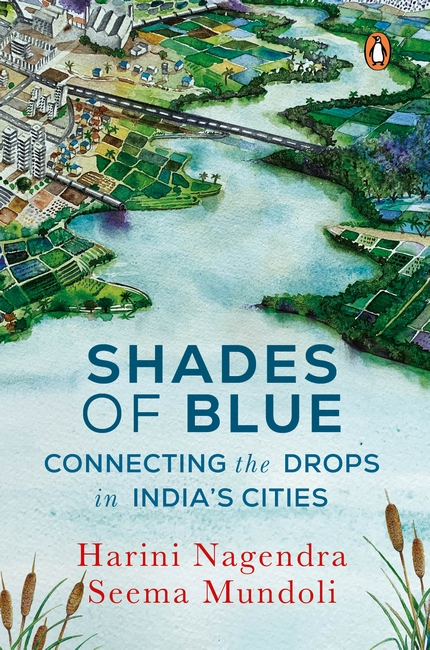
In this passionate and extensively researched tribute to the elixir that sustains us all, authors Harini Nagendra and Seema Mundoli take us on a panoramic view of the water bodies of India and the urgent need to address their emergent ecological threats. From the Yamuna in Delhi to the Cauvery in Karnataka and the Pichola Lake in Udaipur to the Brahmaputra in Assam, this book is epic in its sweep and yet deeply moving in its intimate concerns.
More Information : https://sarainwater.org/wp-content/uploads/2023/08/Shades-of-Blue.docx
Green roads for water
Problems caused by roads on the hydrology, the landscape and the livelihoods of roadside communities can be turned into opportunities for better water management.
Read more : https://openknowledge.worldbank.org/handle/10986/35752
Climate indicators strategic briefing by the World Economic Forum
Despite the adoption of the Paris Agreement on climate change and the establishment of the 2030 United Nations Sustainable Development Goals, significant gaps remain between the scientific and political communities when it comes to understanding how climate change risks cascade through environmental, social, and economic systems.
Read more : https://sarainwater.org/wp-content/uploads/2023/08/Climate-indicators.pdf
5 Things to Know about Water and Cities
The rapid urbanization across the world could worsen water problems for many cities.
Read More https://sarainwater.org/wp-content/uploads/2023/07/5-things-to-know-about-water.pdf
Progress on household drinking water, sanitation, and hygiene
The World Health Organization and United Nations Children’s Fund (WHO/UNICEF) Joint Monitoring
Programme for Water Supply, Sanitation and Hygiene (JMP) produces internationally comparable
estimates of progress on drinking water, sanitation, and hygiene (WASH) and is responsible for global
monitoring of the Sustainable Development Goal (SDG) targets related to WASH. In 2022, the JMP
released updated estimates for WASH in schools and WASH in healthcare facilities (2000–2021).
Read more : https://sarainwater.org/wp-content/uploads/2023/07/Progress-on-household-water-and-drinking.pdf
Traditional and indigenous practices for climate resilience
India is renowned globally for its array of diversity that infuses right from the way of living to the way the immediate local environment is managed. From afar, a lot of urban present-day issues seem novel and unique with no reference solutions to look at, but the reality is a lot more than that. A huge generational void of knowledge when it comes to conjuring solutions for these issues is present primarily because our ancestors never had these kinds of issues. Their indigenous way of living was restorative, regenerative, and circular by default.
Assessing the Benefits and Costs of Nature-Based Solutions for Climate Resilience: A Guideline for Project Developers
This document aims to guide the design, implementation, and use of studies to value the benefits and costs of Nature-Based Solutions (NBS) for climate resilience projects.
Read More : https://openknowledge.worldbank.org/entities/publication/9ed5cb4b-78dc-42a4-b914-23d71cef24a2
UN-Water Analytical Brief – Unconventional Water Resources
Around 60% of the global population lives in areas of water stress where available supplies cannot sustainably meet demand for at least part of the year. As water scarcity is expected to continue and intensify in dry and overpopulated areas, the world at large is in danger of leaving the water scarcity challenge to future generations who will be confronted with the consequences of today’s practices.
Read more:
With women better results in water management
This publication by Women for Partnership and GIZ is based on a study that consists of desk research and a presentation and analysis of thirteen case studies covering private water operators, governmental water agencies, community groups, national and international NGOs, and research institutes in several parts of the globe, including India, Tanzania, Great Britain, Bolivia, Bulgaria, Armenia, India, the Nile Basin, Malawi, Jordan, Madagascar, and Africa. The practices described in the case studies vary from access to water, sanitation, and hygiene, to water awareness, water quality, the fight against pollution, irrigation, research in the field of climate and water, to transboundary water management and the complete water sector within a country,
In many countries, women are responsible for water and have therefore gained significant knowledge in the field of water management. This knowledge is insufficiently utilised in the professional water sector. It is as such, a hidden source of ‘capacity’, a source of knowledge often not available in other sectors.
Read more:
Unconventional water sources
Unconventional water resources are essential in building a water future in dry areas where water is recognized as a precious resource and a cornerstone of the circular economy.
Read more on Unconventional water sources:
Climate Change and Community Resilience Insights from South Asia
Editors: A. K. Enamul Haque · Pranab Mukhopadhyay · Mani Nepal · Md Rumi Shammin
A timely publication that highlights local initiatives on climate change adaptation and resilience building in South Asia, which is one of the most vulnerable regions of the world to climate change impacts. Using a narrative style, this book draws on stories and examples from seven South Asian countries—Bangladesh, Bhutan, India, Maldives, Nepal, Pakistan, and Sri Lanka—to highlight how communities in South Asia are building resilience to climate change. A total of 58 authors have contributed to this volume.
Read more:
The role of sound groundwater resources management and governance to achieve water security
The true value of groundwater is hidden beneath the ground. Often, the general public and policy- makers are not fully aware of the importance of this precious resource, even though groundwater provides nearly 50% of all drinking water. While the pressure on groundwater has been steadily increasing, this invisible resource continues to receive less attention than it deserves. This Global Water Security Issues (GWSI) Series 3, The role of sound groundwater resources management and governance to achieve water security explores various case studies of tools and analyses of management, groundwater quality issues, transboundary aquifer management, and stakeholder engagement. TheGWSI shines a spotlight on groundwater resources to highlight the importance of integrated water resource management and strengthened capacity for robust management decisions.
Read more: https://unesdoc.unesco.org/ark:/48223/pf0000379093.locale=en
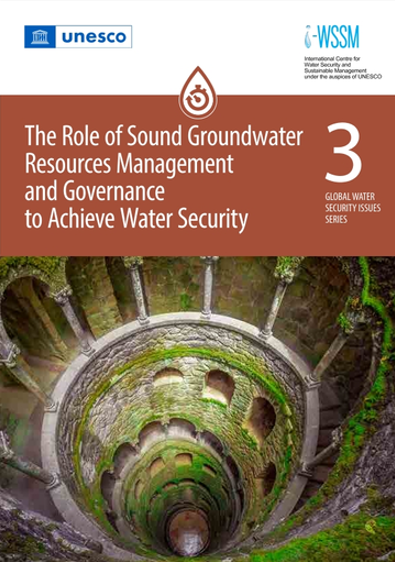
Urban water security: A comparative assessment and policy analysis of five cities in diverse developing countries of Asia
Cities are rapidly expanding and invariably moving toward densification. Global challenges such as climate change, land-use change, environmental degradation, and expanding economy in urban areas increase water-related problems. This study addresses the difficulty of operationalizing the concept of urban water security by applying an integrative indicator-based urban water security assessment framework, formed by integrating two well-established frameworks, to evaluate the water security state in five different cities in Asia: Bangkok, Jaipur, Hanoi, Islamabad, and Madaba.
Read more: https://www.sciencedirect.com/science/article/abs/pii/S221146452200015X?via%3Dihub
Basin connected cities, connecting urban stakeholders with their watersheds
Around 55% of the world’s population live in urban areas or cities, and this is expected to rise to 68% by 20501. As cities grow there is increasing pressure on natural resources within and beyond their hydrological basins. While water nnects across sectors, places and people, as well as geographic and temporal scales, hydrological and administrative boundaries do not always coincide.Building a “City-
Basin Dialogue” can be a mechanism to move towards sustainable water management. Different stakeholders from catchment to consumer can be engaged in identifying and implementing appropriate and sustainable solutions for effective city-basin multi-level governance.
Read more : https://iwa-network.org/wp-content/uploads/2022/03/Brochure_Handbook_Basin_Connected_Cities_final.pdf
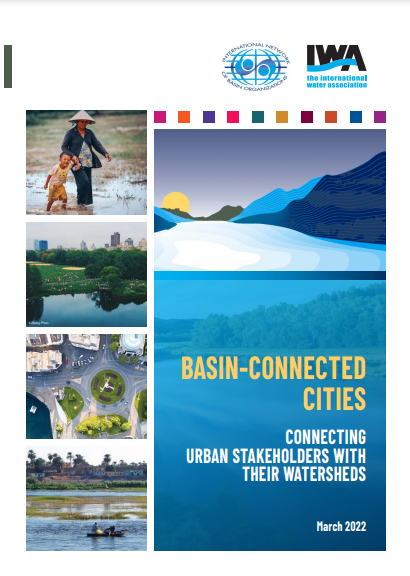
UN World Water Development Report
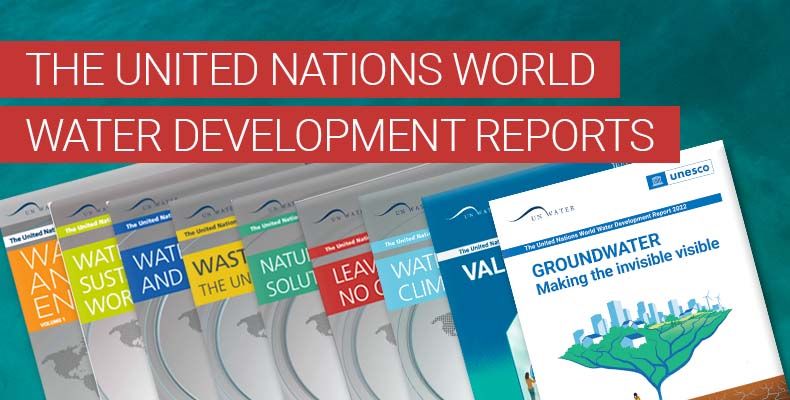
The United Nations World Water Development Report (WWDR) is UN-Water’s flagship report on water and sanitation issues, focusing on a different theme each year. The report is published by UNESCO, on behalf of UN-Water and its production is coordinated by the UNESCO World Water Assessment Programme. The report gives insight on main trends concerning the state, use and management of freshwater and sanitation, based on work done by the Members and Partners of UN-Water
Green Roads for Water: Guidelines for Road Infrastructure in Support of Water Management and Climate Resilience
This book provides strategies to use roads for beneficial water management tailored to diverse landscapes and climates, including watershed areas, semiarid climates, coastal lowlands, mountainous areas, and floodplains. The underlying premise of Green Roads is therefore quite simple: designing roads to fit their natural and anthropomorphic contexts; minimize externalities; and balance preservation of the road, water resources, landscape, and soil resources will usually cost less than traditional protective resilience approaches and will produce more sustainable overall outcomes.
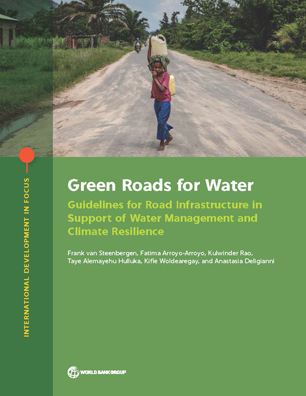
Women Water Champions: A compendium of 41 women stewards from the grassroots
A report published in June 2021 by UNDP India. UNDP-SIWI Water Governance Facility (WGF)’s under the Goal Waters Programme, with support from Sweden, provided funding and technical expertise to UNDP India in this WWC initiative.
This compendium is only a first step in documenting and recognising women’s participation in the water sector, among many others who are breaking gender barriers in water management.
These women are from different regions, from the remotest of villages and tribal belts in the country, from different socio-economic and educational backgrounds. It covers nearly 14 states in India: Andhra Pradesh, Assam, Bihar, Haryana, Gujarat, Jharkhand, Maharashtra, Madhya Pradesh, Odisha, Rajasthan, Tamil Nadu, Uttarakhand, Uttar Pradesh, West Bengal.
The works range from mobilizing communities on water conservations, flood management, promoting and practicing water use efficiency, creating rainwater harvesting infrastructure, irrigation water management and improving agricultural productivity, restoration of groundwater, awareness building in clean drinking water, leading water user groups, and working towards sustainable development. These pathbreaking works highlight that these women have not only secured their livelihoods and protected their communities through environmentally sound and sustainable practices, they have often also helped to further empower other women, upscale the activities and bolster economic opportunities for many.
Read more:
Water, Flood Management and Water Security Under a Changing Climate: Proceedings from the 7th International Conference on Water and Flood Management
This book presents selected papers from the 7th International Conference on Water and Flood Management, with a special focus on Water Security under Climate Change, held in Dhaka, Bangladesh in March 2019. The biennial conference is organized by Institute of Water and Flood Management of Bangladesh University of Engineering and Technology.
The recent decades have experienced more frequent natural calamities and it is believed that climate change is an important driving factor for such hazards. Each part of the hydrological cycle is affected by global climate change. Moreover, increasing population and economic activities are posing a bigger threat to water sources. To ensure sustainable livelihoods, safeguard ecosystem services, and enhance socio-economic development, water security needs to be investigated widely in a global and regional context.
Read more https://link.springer.com/book/10.1007/978-3-030-47786-8#editorsandaffiliations
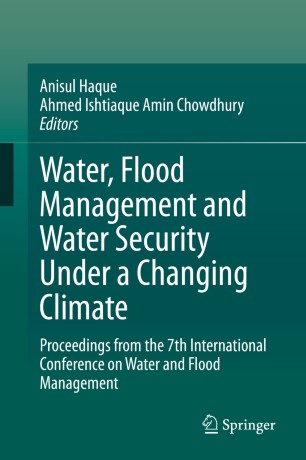
Community Participation in Decision-Making Evidence from an experiment in providing safe drinking water in Bangladesh
Delegating decision-making authorities to communities in projects to provide safe drinking water has the potential to improve projects in terms of outcomes and reported impact. In villages where projects were implemented under a participatory decision making structure (the NGO Facilitated Community Participation model), a slightly larger number of safe drinking water sources were installed(0.2 more sources) but obtained an 8% higher increase in access to safe drinking water, than under a non-participatory decision-making structure (the TopDown model). These results are broadly consistent with evidence accumulated in the past through practitioner’s experience and cross-sectional analysis, but this is the first time that experimental evidence has been available to test the hypothesis that participation in decision-making has a positive impact on the result of social programs.
Read more: \Bangladesh\info
Rainwater Harvesting System: Using water for the Future
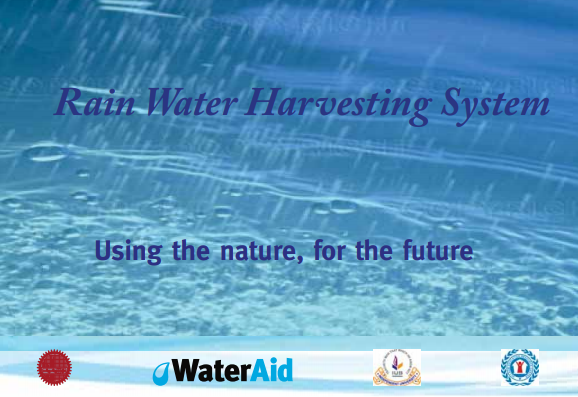
Findings from quasi-experimental study: WASH in Schools – MHM and Learning Impact
The impact evaluation data shows that the chances of managing menstrual hygiene properly are 1.3-fold higher among schoolgirls that received inclusive WASH intervention than schoolgirls who did not.
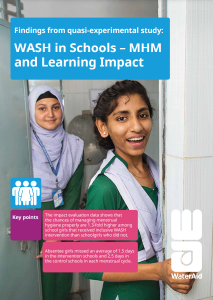
Prospects, practices and principles of urban rainwater harvesting in Bangladesh: A Guidebook for Professionals, Practitioners and Students
In the context or urban environment adopting rainwater harvesting technology can reduce the pressure on municipal water supply.
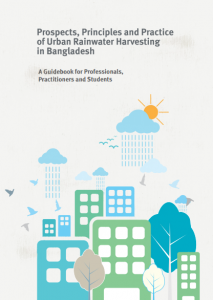
Research study on Nutrition Security and Equity in its Access in Watershed Development Programmes
The priority for the implementation of any watershed Programme is to improve the drinking water status, improving the land productivity and livelihoods of its stakeholders.
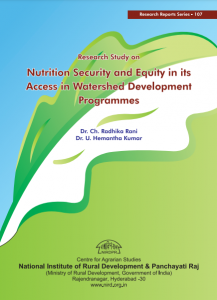
International Rainwater Catchment Systems Experiences: Towards Water Security
Due to population growth, pollution, and climate change, water scarcity will be one of the most critical problems all around the world in the next 15 years. Today, around 10% of the world’s population lacks a proper water supply service. Harvesting rainwater and using it for drinking, domestic, industrial, and agricultural uses will help to supply quality water to urban and rural populations. This book has sections on rainwater harvesting in Bangladesh and Sri Lanka, and from all around the world.
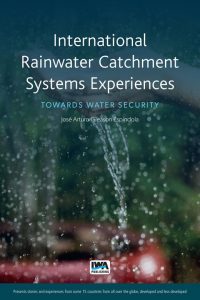
Climate Change: Science and Politics – A CSE India publication
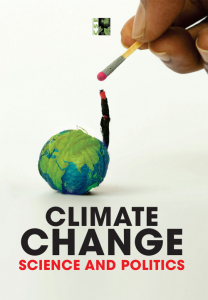
“We need more reality checks in the climate change narrative. The impacts are certain, but as yet, action is pusillanimous. We deserve better. In these COVID-19 times, we have seen disorder and disruption at a scale that we never imagined. So, now we need the same scale to fix what is broken in our relationship with nature. The future, like never before, is in our hands. Nature has spoken. Now we should speak gently back to her. Tread lightly on the Earth”.
This publication uses latest statistics, scientific information and data from sources across the world to cover every key aspect of climate change:
– Emissions
– Negotiations
– Impacts
– Net Zero
– Equity
– Carbon Budgets etc.